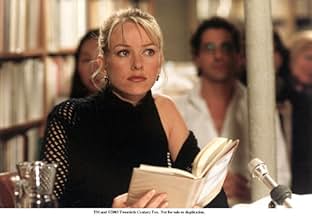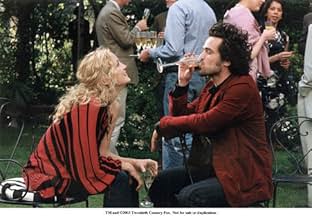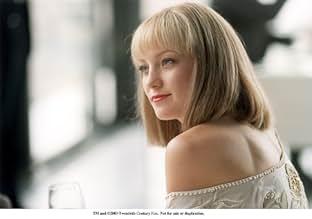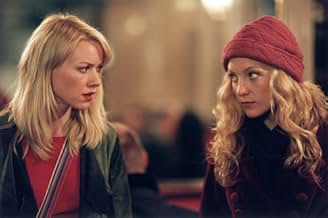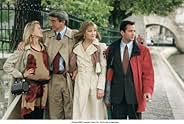ÉVALUATION IMDb
4,9/10
12 k
MA NOTE
Ajouter une intrigue dans votre langueFrench vs. American social customs and behaviors are observed in a story about an American visiting her sister and French brother-in-law and niece in Paris.French vs. American social customs and behaviors are observed in a story about an American visiting her sister and French brother-in-law and niece in Paris.French vs. American social customs and behaviors are observed in a story about an American visiting her sister and French brother-in-law and niece in Paris.
- Prix
- 2 victoires au total
Histoire
Le saviez-vous
- AnecdotesThe painting sold before Roxy's LaTour is Claude-Joseph Vernet's "La Nuit, au Port au Clair de Lune", which is in the Louvre's permanent collection.
- GaffesWhen Isabel and Edgar have their last outing together, Isabel is clearly wearing red nail lacquer in the restaurant. When they say goodbye outside, her nails are no longer red.
- Bandes originalesQu'est-ce qu'on Attend pour Être Heureux ?
Music by Paul Misraki
Lyrics by André Hornez
Performed by Patrick Bruel and Johnny Hallyday
Commentaire en vedette
I keep trying to figure out why this movie is rated so low. I thought it was very good, and that was before I started reading the book -- well more than halfway through, I think it's a faithful adaptation that delivers the storyline and the theme of the novel very well. I tend now to read the novel a movie is based on after I've seen the film, since my experience has taught me that doing the reverse always leads to disappointment in the movie. This was not an error with this title. I think all the casting, all the acting, and especially the direction, were well done.
It seems to me that somehow viewers were expecting too much from the movie. My philosophy is that expectations are arranged disappointments, and I try not to expect anything going in. I do admit that I had some doubts when it seemed that Merchant-Ivory were doing what looked like a light comedy, but there is much more to the book and film than that, first of all, and secondly, why should accomplished filmmakers not move around the genres? Look at Kubrick and The Archers, just to name two, who did so and did it successfully. I wonder how many people went in expecting "Howards End" and thus were disappointed, not in the film but by their own expectations. It's not fair to the filmmakers. Expecting "Le Divorce" to be on par with "Howards End" was like expecting "Howards End" to have the same effect as "Shakespeare Wallah" -- two completely different experiences. It's entirely possible, in fact, that Merchant-Ivory might not have done as good a job on "Le Divorce" had they not made "Howards End" first. It's a matter of process. My point being, that each film must be judged on its own merits.
I've read a couple of comments and message board posts that complain about how the movie makes French people look -- arrogant, garrulous, etc. I think that's overstating a generalization. The movie makes THESE PARTICULAR French people look arrogant and garrulous, because they are -- and devious and self-centered and boorish. But to leap to the conclusion that the movie is making a statement about all French people is patently ridiculous. "The views expressed by the characters in this movie are entirely their own".
On the other hand, one has to remember that Diane Johnson, who wrote the book and a number of books about the culture since, spends half her time in France. She does't take her subjects lightly; she's an intelligent, thoughtful, and though-provoking writer, and I would urge the people who find the movie too subjective to go to its source and read the book. They will find that the book is written from the point of view of one person, and is about the relations between two families -- not two complete cultures. Just because people say something about a culture does't make it true. Perception itself is subjective. In the book (I can't recall if this occurs in the film, I'll have to see it again) Uncle Edgar, perhaps the most sensible character, himself speaks those words that send a shiver of annoyance up my spine: "You Americans. You think..." As if we all think the same thing (and we all know THAT isn't true!). It shows that subjectivity is a common human trait, that we look at the world with our own particular set of blinders, filter our thought through our cultural stance, although I think that perhaps French thought is more synthesized and common than American thought which is, by nature of the population, more diverse.
In the end I think that the book and the film are VERY objective, and let us look at our own judgmental selves and see how the judgmental and subjective nature of our thought and attitude can be damaging and inhibiting. I think that's the theme, and it comes across very well.
It seems to me that somehow viewers were expecting too much from the movie. My philosophy is that expectations are arranged disappointments, and I try not to expect anything going in. I do admit that I had some doubts when it seemed that Merchant-Ivory were doing what looked like a light comedy, but there is much more to the book and film than that, first of all, and secondly, why should accomplished filmmakers not move around the genres? Look at Kubrick and The Archers, just to name two, who did so and did it successfully. I wonder how many people went in expecting "Howards End" and thus were disappointed, not in the film but by their own expectations. It's not fair to the filmmakers. Expecting "Le Divorce" to be on par with "Howards End" was like expecting "Howards End" to have the same effect as "Shakespeare Wallah" -- two completely different experiences. It's entirely possible, in fact, that Merchant-Ivory might not have done as good a job on "Le Divorce" had they not made "Howards End" first. It's a matter of process. My point being, that each film must be judged on its own merits.
I've read a couple of comments and message board posts that complain about how the movie makes French people look -- arrogant, garrulous, etc. I think that's overstating a generalization. The movie makes THESE PARTICULAR French people look arrogant and garrulous, because they are -- and devious and self-centered and boorish. But to leap to the conclusion that the movie is making a statement about all French people is patently ridiculous. "The views expressed by the characters in this movie are entirely their own".
On the other hand, one has to remember that Diane Johnson, who wrote the book and a number of books about the culture since, spends half her time in France. She does't take her subjects lightly; she's an intelligent, thoughtful, and though-provoking writer, and I would urge the people who find the movie too subjective to go to its source and read the book. They will find that the book is written from the point of view of one person, and is about the relations between two families -- not two complete cultures. Just because people say something about a culture does't make it true. Perception itself is subjective. In the book (I can't recall if this occurs in the film, I'll have to see it again) Uncle Edgar, perhaps the most sensible character, himself speaks those words that send a shiver of annoyance up my spine: "You Americans. You think..." As if we all think the same thing (and we all know THAT isn't true!). It shows that subjectivity is a common human trait, that we look at the world with our own particular set of blinders, filter our thought through our cultural stance, although I think that perhaps French thought is more synthesized and common than American thought which is, by nature of the population, more diverse.
In the end I think that the book and the film are VERY objective, and let us look at our own judgmental selves and see how the judgmental and subjective nature of our thought and attitude can be damaging and inhibiting. I think that's the theme, and it comes across very well.
- Thomas-White2
- 28 oct. 2008
- Lien permanent
Meilleurs choix
Connectez-vous pour évaluer et surveiller les recommandations personnalisées
- How long is The Divorce?Propulsé par Alexa
Détails
- Date de sortie
- Pays d’origine
- Sites officiels
- Langues
- Aussi connu sous le nom de
- Le Divorce
- Lieux de tournage
- sociétés de production
- Consultez plus de crédits d'entreprise sur IMDbPro
Box-office
- Brut – États-Unis et Canada
- 9 081 057 $ US
- Fin de semaine d'ouverture – États-Unis et Canada
- 516 834 $ US
- 10 août 2003
- Brut – à l'échelle mondiale
- 12 991 996 $ US
- Durée1 heure 57 minutes
- Couleur
- Mixage
- Rapport de forme
- 2.39 : 1
Contribuer à cette page
Suggérer une modification ou ajouter du contenu manquant

Lacune principale
By what name was Le divorce (2003) officially released in India in English?
Répondre







